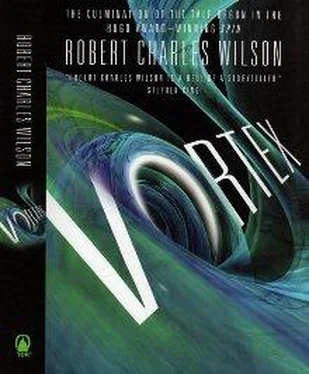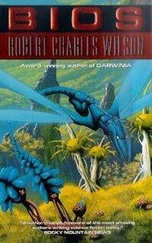After a while she turned back to Turk. He nodded once. “All right,” she said. “Take us home.”
* * *
I let my physical body sleep while I defined a sphere to contain Vox Core and part of the island beneath it. That sphere constituted our border with the exterior universe. Spacetime curved around us in a complex new geometry. Vox Core soared away from the dying Earth as if it had been fired from a gun, though we didn’t feel it: I further modified the local curvature of space to create the illusion of gravity. After a few hours we had passed beyond the orbits of Uranus and Neptune.
Turk and Allison had expressed curiosity about the journey. I would have liked to show them where we were—show them directly, I mean, without mediation—but it was impossible to look at the exterior universe from inside Vox—to human eyes it would have appeared as a literally blinding cascade of blue-shifted energy, even the longest electromagnetic waves compressed to lethal potency. But I could sample that cascade at intervals and downshift it to visible wavelengths to create a series of representative images. I compiled these images and displayed them to Allison and Turk in their forest home. The result was spectacular but not soothing. The sun was a sullen ember against the darkness of space, the Earth already invisible at the edge of the heliosphere. Stars rolled past as Vox Core slowly rotated—a remnant motion I hadn’t bothered to correct. “Lonesome,” Allison remarked in a small voice.
To an outside observer we would have looked like something paradoxical: an event horizon without a black hole, a lightless bubble from which nothing escaped but a few wisps of radiation.
In fact the barrier that enclosed us was more complex than any natural event horizon. There were no words in any human vocabulary to describe how it functioned, though I told Turk, when he asked, that it was both a barrier and a conduit. Through it, I maintained my contact with the Hypotheticals. And as we counted years for seconds I began to feel the long rhythms of the galactic ecology—the voids of abandoned or dying stars, the bright World Rings (only one of which was the familiar human one) thriving under Hypothetical cultivation, the intense activity that surrounded newly formed stars and emerging biologically active planets.
But there was no soul or agency in any of this, only the mindless pulse of replication and selection, unspeakably beautiful but as empty as a desert. The ecology of the Hypotheticals would churn on inexorably until it had depleted every heavy element, exhausted every source of energy within its reach. When the last star blinked into darkness, the Hypothetical machines would mine the gravity wells of ancient singularities; when those singularities evaporated and the universe grew dark and blank… well, then, I supposed the Hypotheticals would die too. And unlike human beings, they would die without complaint. No one would mourn them, and nothing would inherit the ruins they left behind.
It became ever more difficult to remember to tend to the needs of my organic body. I lived in the quantum processors at the heart of Vox Core, and, increasingly, I lived in the cloud of Hypothetical devices that surrounded and followed us as we fell between the stars.
I allowed myself to wonder what would happen when Turk and Allison eventually left me. Where I would go. What I would become.
* * *
Allison had preserved, or perhaps inherited, her namesake’s penchant for writing. I discovered she was setting down a narrative of everything she had experienced between the Equatorian desert and the holocaust of the Vox Archipelago, the words painstakingly hand-printed on crisp white paper. When I asked her who she was writing it for, she shrugged. “I don’t know. Myself, I guess. Or maybe it’s more like a message in a bottle.”
And wasn’t that what Vox Core had become? A bottle adrift and far from shore, its glass baked green by sun and starlight, bearing messages of bone and blood?
I encouraged her to keep writing and I memorized each page she showed me: that is, I committed it to every repository of memory available to me, not just my mortal brain but the processors of the Coryphaeus and the archival clouds of the Hypothetical entities surrounding us. One day these words might be all that remained of her.
I suggested to Turk that he might write his own story, but he didn’t see the point of it. So I settled for conversation. We talked, often for hours, whenever I sent my mortal body to visit their forest home. I knew everything the Coryphaeus had once known about him, including what Turk had said to Oscar about the man he had killed, and he was able to speak freely.
“I made it my business to learn about Orrin Mather,” he said. “He was born with some kind of brain damage. He lived most of his life with an older sister in North Carolina. He got into a lot of fights, drank some, eventually left home and made his way west. He held up a few stores when he ran out of cash and put a man in the hospital once. He wasn’t a saint—far from it. But I didn’t know any of that when I did what I did. Really he was just somebody who got dealt a bad hand at birth. Other circumstances, he might have been something else.”
Which was true of all of us, of course.
I told Turk that if he wrote down what he remembered about Orrin Mather and Vox Core I would keep the words safe, along with Allison’s, as long as Vox and the Hypothetical ecology survived.
“You think that’ll make any kind of difference?”
“Not to anyone but us.”
Turk said he would think it over.
These people, Allison and Turk, were my friends. They were the only real friends I had ever had, and I was sorry I would have to leave them. I wanted something of theirs to carry with me.
* * *
The Hypothetical ecology was a forest, lush and mindless, but that didn’t mean it was uninhabited. You might say it was haunted.
I had had hints of this before. I wasn’t the first human being to access the memory of the Hypotheticals, though my case was certainly unique. The Martians had attempted such connections, sporadically, in the years before the bionormative movement suppressed all such experiments. The first human being on Earth to make the link was Jason Lawton: he had survived his own death by colonizing the computation space of the Hypotheticals—still survived there, perhaps; but his capacity to act, his agency, had been very limited. (It occurs to me that this is almost the definition of a ghost.)
And many of the nonhuman civilizations that had come before us had found their own ways into the forest.
They remained there still, long after their physical civilizations had declined and vanished. They were difficult for me to detect, since their activity was disguised to prevent the Hypothetical host networks from identifying and deleting them. They existed as clusters of operative information—virtual worlds—running inside the data-gathering protocols of the galactic ecosystem.
I sensed their presence but could discern little else about them. The content of these clusters was fractally distributed and impenetrably complex. But there was genuine agency there—not just consciousness but deliberative action that affected external systems.
So I was not alone!—though these alien virtualities were so well defended that I couldn’t contrive a way to contact them, and so ancient and inhuman that I probably wouldn’t have understood anything they might have had to say.
* * *
Most of a year had passed since our initial conversation when Turk handed me, without comment, a sheaf of papers on which he had written the history of his experiences in Vox Core. ( My name is Turk Findley, it began, and this is the story of the life I lived long after everything I knew and loved was dead and gone. ) I thanked him gravely and said nothing further about it.
Читать дальше












